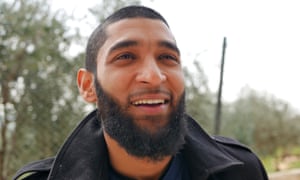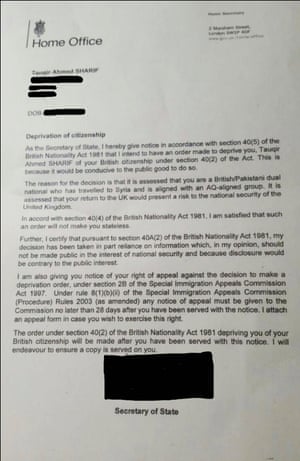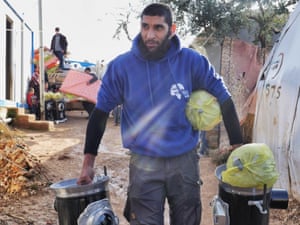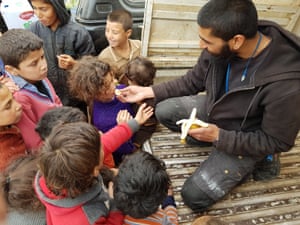{UAH} Aid worker stranded in Syria after British citizenship revoked
Aid worker stranded in Syria after British citizenship revoked
Tauqir Sharif calls on UK to distinguish between humanitarian workers and potential security threats
A British aid worker and his family say they are stuck in Syria after his UK citizenship has been revoked and his eldest daughter refused a passport.
Tauqir Sharif, 31, from Walthamstow, who lives and works in Idlib alongside his British wife, Racquell Hayden-Best, had his citizenship revoked in May 2017. Speaking to the Guardian this week, he called on the UK government to review its revocation policy for those engaged in humanitarian work in conflict zones.
Sharif is appealing against the UK government's decision and has asked for a fair hearing in an open court where evidence against him can be tested by a judge and jury. He claims aid workers and doctors are unfairly judged in the same category as jihadists.
"Our job is to help those in need," Sharif said. "I have friends here who are doctors, British expats … Whoever comes into a hospital, whether Isis or Bashir supporter, they will treat them because they are trying to save lives. We are different. We are trying to help the people who are displaced, ordinary Syrians – women, children, orphans."
Sharif founded the organisation Live Updates from Syria in 2012, providing support and assistance for families there, and raising awareness about the devastating situation on the ground.
"I know people are saying it's strange that as the war in Syria is coming to an end, people coming out of Isis are claiming to be aid workers," he said. "There may be people using that as cover, but for myself and my wife, our history is very well documented. We have 41 projects running, with 170 staff. We are a well-established organisation on the ground. Syrian people see the value in our work and love us.
"I'm not an Isis sympathiser. They have tried to kill me. I believe that they are the worst representation of Muslims."
As the war in Syria draws to a close, the UK Home Office faces the dilemma of determining citizenship rights of hundreds of British nationals and, in some cases, their children, who seek to return home. Work carried out by aid workers and doctors operating in conflict zones can complicate matters significantly, as humanitarian work can blur the rules of engagement.
A letter from the Home Office to aid worker Tauqir Sharif, whose citizenship was revoked in May 2017. Photograph: Courtesy of Tauqir SharifDismissing the "secret hearings" used by the UK government to determine if citizenship should be revoked, Sharif demanded that people like him – as well as Shamima Begum, the teenager who fled the UK to join Isis – should have the right to a fair trial. He insists he has broken no laws and has a history of humanitarian work.
"I have had friends killed by Isis. I've been targeted by Isis. They say that I am not a Muslim because I didn't join them or because I'm helping Syrian people. They excommunicate me from 'their religion'. I've had bombs put under my car. They've tried to blackmail me."
Sharif insisted the British authorities needed to take into account the conditions under which those caught up in the conflict live and how aid is seen as a valuable commodity to all sides. He readily admitted that since his arrival in Syria he has carried a handgun and has used an assault rifle, and he is willing to justify their use in court. "The handgun is for my self defence and that of my family. I've not had to use it. There have been threats to my life because I distribute aid. It's highly dangerous work in conflict zones.
"We travel in convoy to different towns, we come under attack from all sides, sometimes finding ourselves in the middle of battles or [getting] attacked by those who want to steal. We have to protect not only the aid but also ourselves. Up until early 2017, I used to carry an assault rifle. Yes, I've fired it, shooting back at people who shot at us, who want to kill us. But I'm not a fighter, I'm an aid worker.
"We've been in situations where we have been surrounded and had to 'engage' to get ourselves out. You could say technically that is a combat situation, but we only fire back in self defence. I haven't killed anyone – not to my knowledge.
"I have never aligned myself with any group involved in the conflict or taken part in any operation that is not related to my aid work. I no longer carry an assault rifle as we now have security, so I only need my handgun. In the early days, I did stupid macho-hero things. I've posed with my gun and assault rifle. Stupid, I know, but that was in my younger days. I've learned my lesson, as someone tried to blackmail me over it.
Tauqir Sharif in Syria: he founded the organisation Live Updates from Syria in 2012. Photograph: Courtesy of Tauqir Sharif"Over here people get killed. A few months ago, British aid worker Mohammed Shakiel Shabir was kidnapped by one of the groups. They demanded a $4m [£3m] ransom." He pointed to the armed escorts used by larger charities operating in conflict zones, saying as an independent he was forced to take that role himself.
"When I got the letter [revoking my citizenship] I was shocked … I had heard of other people's citizenships being revoked – mine was within the last batch of people. We were surprised as we were well-known aid workers, activists or doctors."
The letter stated that under section 40(5) of the British Nationalities Act 1981, he was to be deprived of his British citizenship as he had been assessed to be"aligned with an al-Qaida-aligned group". His return to the UK would, it said, present a risk to national security. The information on which the assessment was made was not disclosable due to national security interests.
"They are saying that I"m guilty by association with two degrees of separation? Its crazy they are not accusing me of being part of a prescribed group, I'm not part of ISIS, or Al Qaeda, I'm not engaged in terrorism but they say I'm "aligned", what does that mean?
"Unfortunately, this is the narrative," Sharif said. "Every person who goes to [Syria] is a terrorist. That saddens me. It's naive to think that Syria is no more than Isis or al-Qaida. There are 6 million innocent, normal people having their families killed and slaughtered.
"I have witnessed so many massacres, I've seen cluster bombs being dropped, gas attacks, children burned alive. No one can say to me that Bashar al-Assad is not a criminal because I have witnessed it.
"The question that I have to ask is: 'Are we really British?' For me, I was always told that I was British and that whatever I do, I have equal rights to vote, to work, equal principles … If a white colleague were to do the same as us they wouldn't get their citizenship revoked. I find that racist.
"My wife has not had her citizenship revoked, even though we do the same work. You can see her online doing distribution, teaching English. She has been involved in the work from day one. We have so much footage as evidence."
His wife, Racquell Hayden-Best, could return to the UK, leaving her husband behind. However, the situation for the couple's children remains uncertain.
"Our first daughter was born in Turkey. We applied for a [UK] passport for her but the British government messed us around … I rang them over 50 times … still nothing. My lawyer says that my children have UK citizenship by default but as I no longer have access to a consulate, I am unable to get a passport for her or my other children."
Sharif now fears that under the new Counter-Terrorism and Border Security Act, the home secretary, Sajid Javid, will designate Idlib a no-go zone for British nationals. "It would be illegal to enter the area, and anyone who lives there would have a month to leave. We might find ourselves having to hand ourselves over to the Turkish authorities explaining our humanitarian work, seeking some sort of amnesty."
Sharif undertaking humanitarian work in Syria. Photograph: Courtesy of Tauqir SharifDescribing himself as British Pakistani East Londoner, Sharif said: "I know there are people in the UK who will never accept us as being British because of far-right rhetoric or racism, but I have never faced that in London.
"One of the most amazing things about London is its multiculturalism, its diversity. I am a product of London. If I was to go to Pakistan, I can't speak the language properly. I would need a translator. Culture and the stuff that defines you is where you were born and brought up. What I learned while in the UK was British values that have shaped me – good, universal values."
Sharif first started humanitarian work in 2009, joining an aid convoy to Gazawith the former MP George Galloway. He survived the Mavi Marmara incident when Israeli commandos boarded an aid vessel, killing nine activists.
In 2010, he carried out flood relief work in Pakistan. In 2012 Sharif, with Hayden-Best, travelled to Syria as logistics leader for the first aid convoys from Britain to Syria, using ambulances to take in food and medical supplies. He stayed, helping set up makeshift schools and setting up his own aid organisation.
The Home Office was unwilling to comment on the family's case, referring instead to the press statement on Shamima Begum, which read: "In recent days the home secretary has clearly stated that his priority is the safety and security of Britain and the people who live here.
"In order to protect this country, he has the power to deprive someone of their British citizenship where it would not render them stateless.
"We do not comment on individual cases, but any decisions to deprive individuals of their citizenship are based on all available evidence and not taken lightly."
Disclaimer:Everyone posting to this Forum bears the sole responsibility for any legal consequences of his or her postings, and hence statements and facts must be presented responsibly. Your continued membership signifies that you agree to this disclaimer and pledge to abide by our Rules and Guidelines.To unsubscribe from this group, send email to: ugandans-at-heart+unsubscribe@googlegroups.com












0 comments:
Post a Comment